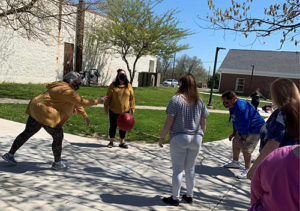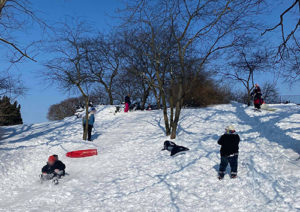Project-Based Learning to Enhance Crossroad Academy Students’ Education and Life Skills

Crossroad Academy, the on-campus school of Crossroad Child & Family Services in Fort Wayne, Ind., is introducing an innovative system of education for the 2021-2022 school year. The academy — accredited by the Indiana Department of Education and AdvanceED — is joining the New Tech Network, which incorporates project-based learning in a student-centered method of teaching.
Because the program is geared more toward the interests of the students, the majority of the school day is hands on, says Amy Kohler, a Crossroad teacher. “My hope is that the program will engage our students more, because most of them are not ‘pencil and paper’ learners.”
In the New Tech system, each classroom is organized into small groups. Jobs are assigned to each group member, based on their passion and skills. The students learn teamwork and the importance of not letting other team members down.
“Our kids have not been very successful in traditional school, with the teacher in front talking to the students,” says Kirk Doehrmann, Crossroad Academy’s principal. “This program gives students a voice in their own education, and provides them with some choices. Projects are not teacher driven; they are student driven.”
The New Tech Network provides five rubrics for assessing skills: written; oral; skills and knowledge; collaboration; and agency, which includes effort, practicing to grow, seeking challenges, growing from setbacks, seeking feedback, active participation, and relationship building. Through these emphases, the students become better equipped to become contributing adults in society.
Another difference is that the academy emphasizes “power standards” — four areas of focus for the year that should equip the students to do well on the standardized end-of-year tests.
The New Tech Network holds particular promise for Crossroad’s children and youth, who come to the residential campus and its school because of trauma-caused behavioral or emotional difficulties. Many have never been told that they are important and loved.
Each class holds an initial event — a guest speaker from the community, movie clip, or other activity. Both before and after that event, the teacher talks to the students about what they know and what they need to know. The teacher emphasizes that what the students already know is valued and valuable. “In a traditional school, they often haven’t had that kind of feedback before,” says Doehrmann.
Children and youth come into the Crossroad system at different points in the school year. Instead of large classes, New Tech Network organizes the students into groups of four or five members. Many times, the most important aspect of the small groups is the relationship building.
“Most of the Crossroad kids don’t have a clue on how to form relationships” when they arrive, Doehrmann says. “Here, they are automatically in a small group, which helps them learn the skills of collaboration, relationship building, how to talk to people, and how to listen to people.”
The more traditional method of teaching is creatively included in New Tech Network. “We don’t throw out traditional teaching all together. During a specific project time, there’s still time built in to have lab time with the teacher. For example, if a teacher has three groups in a classroom, at times, the teacher holds a more traditional class to meet needs. Sometimes, one of the kids is a liaison with the teacher, where the student learns the material and has to go back to the group and teach it.”

Often traditional subjects are combined. American Studies, for example, is a combination of U.S. History and English, because two subjects share similar standards and requirements. The combination also helps create interesting small group projects.
Doehrmann gave an example of a school using New Tech Network that had one small group holding a panel discussion during an election year to discuss the needs of young people getting involved in civics. After viewing a relevant excerpt from the TV show “Newsroom,” they discussed whether the United States was still “the greatest country in the world.” Their final project was to host local school board members who were running for election. It included a written portion, where they showed the knowledge they had gained, and an oral project which included introducing panelists talking about the importance of the subject, and sponsoring a voter registration drive.
But Doehrmann was not an “early adopter” of New Tech Network. He says he had observed another school system using it and wasn’t impressed. But six months later, his daughter, Katie, reported that her school had started a New Tech School, and she wanted to attend. Within a few months, says Doehrmann, “my kid is coming home with skills — collaboration and group skills — that were great.”
A good friend of Katie’s — “who was totally nonverbal in public before going to the school,” says Doehrmann — also attended. Doehrmann started taking his teachers over to the New Tech School to observe. Each time, a student panel would talk to the panel. “Initially, the teachers thought, ‘Well, the kids have chosen to go to this school. They’re the best of the best,’” Doehrmann adds. “But one of the kids was Katie’s friend. And that friend was part of the panel talking to visiting teachers. These kids are so well spoken because they’re used to being in front of people and presenting and doing things.” Today, Katie’s friend is a successful set designer.
The introduction of the program began with the faculty in June 2020, when they attended sessions to learn about school design and culture. Throughout this year, despite COVID restrictions the teachers had to keep adapting to meet, the school has slowly implemented the new design and culture. Although not yet project based, lessons have included students assessing how they are doing before and after assignments. Staff also participated in New Tech residency training, during which they delved into the community agreements they need to successfully operate the school. These agreements foster accountability among staff.
During the first week of June, the teachers will have the final New Tech Network school training. During the six weeks of summer school, the whole academy will work on a community project in order to introduce students to the concept, culture, and words that will be used. “The all-school project will let the kids involved over the summer so that in August, everyone is ready for full implementation of the New Tech Network,” Doehrmann adds.
At Crossroad, says Kyle Zanker, chief development officer at Crossroad, several outcomes are tracked. The education outcome is registered upon a child’s arrival, throughout their stay, when they leave, and then a year later. The education outcome is based on behavior, achievement, and attendance/the ability to stay in the classroom.
Teacher Amy Kohler says that sometimes that’s the hardest part for the students. Pre-Covid and before the New Tech Network, “I had 16 students and I would call it successful if they were staying in class all day, and didn’t get frustrated and leave the room,” she says.
But since the teachers started implementing the culture of New Tech Network, Zanker, Kohler, and Doehrmann all have seen and felt a shift.
“The thing that’s most remarkable is the enthusiasm we’re already seeing across campus — even though we haven’t totally rolled out the program,” Zanker says. “The students are responding differently already.”
The New Tech Network is “an opportunity to give the kids the self-advocacy skills, communication skills, and collaborative skills they need to be successful. Those are the things that are really important, Doehrmann adds. “This program will help the kids re-integrate into their home lives and communities.”
“I want to be able to live in a community where there’s great people, and I think this program moves the students in that direction,” he says, because they’ll learn to “be able to deal with conflict in the right way; to meet challenges and setbacks in the right way; to be able to openly building relationships with people who many not be like them; and to be able to be empathetic to people who are less fortunate.”
Join Our Mailing LIst
Follow on Facebook
Iredell Adult Day Services Hosts Ribbon-Cutting to Celebrate Adult Day Health Certification - CHHSM
www.chhsm.org
Iredell Adult Day Services (IADS) in Newton, N.C. — a nonprofit organization dedicated to caring for older adults, vulnerable groups, and their families, and part of EveryAge — hosted a ribbon cut...